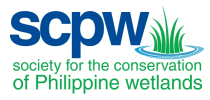 To regularly conduct an Ecological Camp, dubbed as Kabataan Para sa Lawa, is part of the plan strategy of CLEAR in its campaign to educate the community, particularly the youth, on the need to conserve and protect Laguna de Bay. The ecological camp aims to ensure the sustainable conservation and protection of Laguna de Bay and to foster a deeper sense of appreciation and commitment especially among the lakeshore communities. CLEAR, the Conservation of Laguna de Bay’s Environment and Resources, is the tripartite partnership of Society for the Conservation of Philippine Wetlands, Inc. (SCPW), Laguna Lake Development Authority (LLDA) and Unilever Philippines. more about CLEAR >>
To regularly conduct an Ecological Camp, dubbed as Kabataan Para sa Lawa, is part of the plan strategy of CLEAR in its campaign to educate the community, particularly the youth, on the need to conserve and protect Laguna de Bay. The ecological camp aims to ensure the sustainable conservation and protection of Laguna de Bay and to foster a deeper sense of appreciation and commitment especially among the lakeshore communities. CLEAR, the Conservation of Laguna de Bay’s Environment and Resources, is the tripartite partnership of Society for the Conservation of Philippine Wetlands, Inc. (SCPW), Laguna Lake Development Authority (LLDA) and Unilever Philippines. more about CLEAR >>
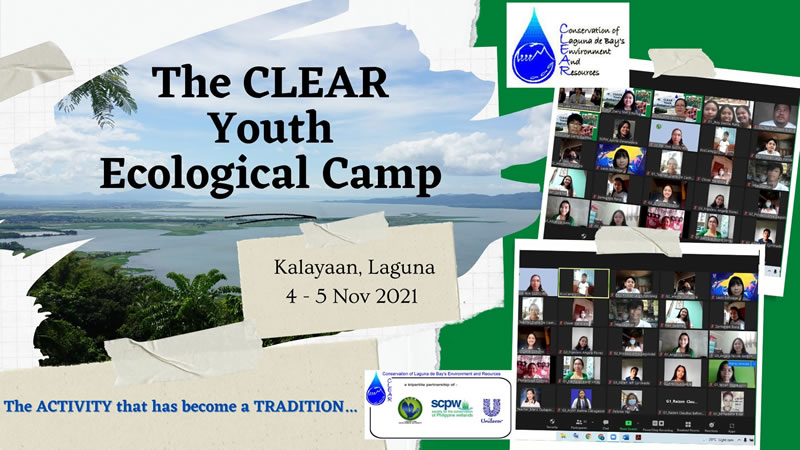
Due to the current Covid-19 health protocols, the Youth Eco-Camp curriculum has been modified to be more compatible with an online platform. From a three-day in-person curriculum, CLEAR is now testing a virtual activity comprising one and a half days of online learning sessions, audio-visual presentations, breakout sessions, visioning, and action planning. On 4-5 November 2021, the CLEAR Youth Ecological Camp for Kalayaan, Laguna was conducted online in Zoom Platform.
The objectives of the Eco-Camp are as follows:
- To learn about the basic ecological principles and how it applies to lake conservation.
- To learn about the environmental status of the lake, the pressures and problems besetting it, and identify solutions that they can implement at their level.
- To appreciate the value of camaraderie and partnerships in working towards the conservation of Laguna de Bay and Caliraya Lake.
- To strengthen and expand the reach of the CLEAR Youth Network.
Participants
The youth participants were composed of 25 high school students (Grade 8 and Grade 9) with three teachers from the high schools in Kalayaan, Laguna: San Juan National High School – Main, San Juan National High School – Annex, and Liceo de San Antonio. The eco-campers were selected based on a criteria set by the CLEAR Program and with assistance from the Municipal Government of Kalayaan in the Province of Laguna.

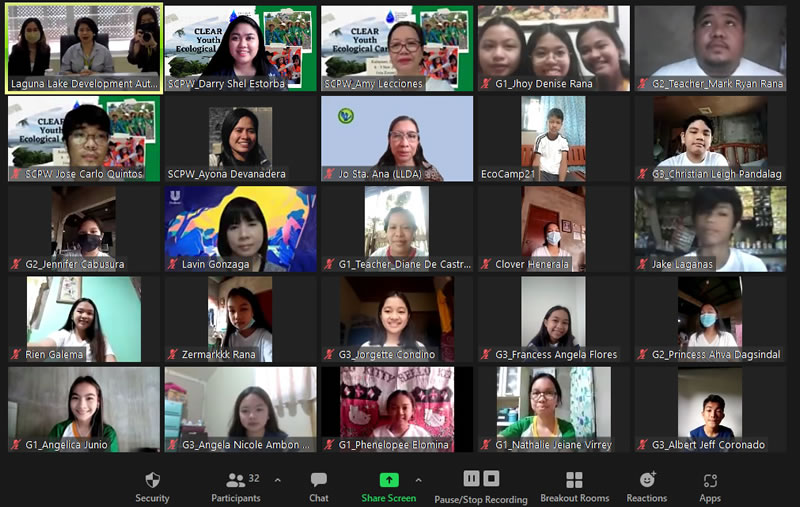
Opening of the Program
In behalf of the Municipal Mayor of Kalayaan, the Municipal Administrator, Ms. Kris Anne L. Pesigan delivered the opening remarks. She expressed her gratitude to the CLEAR partners for selecting Kalayaan for this year’s Eco-Camp. She looked forward to seeing the participants learn more about environmental conservation in the future.
This was followed by a message from Ms. Amy Lecciones, Vice President and Executive Director of SCPW. She gave a brief background on CLEAR and the partnership, including its history, goals, and activities, among others. Further, Ms. Lecciones asked for the cooperation and understanding of everyone involved in the event, particularly the participants, for any glitches that may occur in the activity considering that this is the first time the virtual curriculum is being implemented.
Ms. Maureen Tolentino, Executive Assistant to the General Manager of LLDA, expressed her excitement for this virtual Eco-Camp. Also, she admired the beauty of Caliraya Lake and encouraged the participants to become more active and participative in learning more about helping in the protection and conservation of this important resource.
Ms. Lavin Gonzaga, Community Relations and Sustainability Manager of Unilever Philippines, also delivered a message for the event. In particular, she emphasized the long-standing partnership with SCPW and LLDA in the CLEAR Program. She also mentioned Unilever Philippines’ efforts and initiatives with SCPW especially on plastic recovery projects in some municipalities in Laguna.
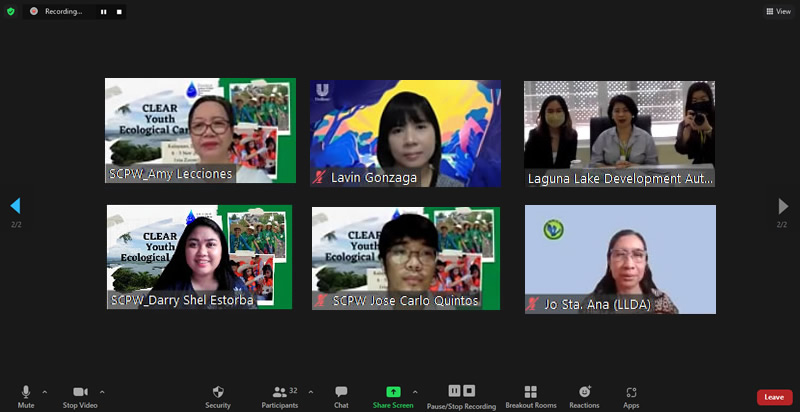
Learning Session
Before the lectures, getting-to-know-you activity was facilitated by Ms. Darry Shel Estorba of SCPW. This activity was aimed at promoting camaraderie among the eco-campers and fostering good working relationships among the participants.
The Learning Session was composed of lectures –
- “Conserving our Wetlands”
(Audio-Visual Presentation)
The primary objective of this presentation is to give an overview of what wetlands are, their importance, functions, status, and interventions made so that the eco-campers will have a common understanding of the topics and activities during the Eco-Camp.
- “The Seven Environmental Principles”
(Ms. Amy Lecciones, Society for the Conservation of Philippine Wetlands, Inc.)
This is to provide participants with an understanding of the theoretical underpinnings of various environmental concepts. It also provides participants with a holistic perspective on the environment and its components, as well as an understanding of why environmental conservation and sustainable development are critical. Given were specific and concrete examples that could serve as guide for the participants as they conceptualize their plans for their conservation activities.
- “The State of Laguna de Bay”
(Engr. Jocelyn Sta. Ana, Laguna Lake Development Authority)
Engr. Sta. Ana presented a map and discussed some basic information about Laguna de Bay. She also reported various efforts of LLDA to conserve the lake. Moreover, she discussed the various parameters used to assess the water quality of the lake, and how human activities affect the water quality of the lake.
- Environmental Profile of Kalayaan, Laguna
(Ms. Reinelsa Barojabo Corpuz, Municipal Environment and Natural Resources Office – Kalayaan, Laguna)
Ms. Corpuz began her presentation with an AVP about Kalayaan and Caliraya Lake to provide the participants with a general overview of the area. Following that, she discussed the environmental profile of Kalayaan as well as the local government’s efforts in environmental conservation, particularly in solid waste management.
- “Solid Waste Management”
(Mr. Jose Carlo H. Quintos, Society for the Conservation of Philippine Wetlands)
Mr. Quintos presented various statistics on solid wastes in the Philippines to highlight the serious problem that the country is facing with regard to solid wastes. He also indicated different types of wastes and how these wastes affect the environment, particularly wetlands, as well as how these wastes contribute to disaster risks that have an impact on the welfare of the general public and the environment. Consequently, he introduced various ways of reducing and managing these solid wastes, including sample initiatives of the CLEAR Youth Network in terms of solid waste management, such as Sachet Recovery Projects, Composting, School Gardens, among others.
Action Planning / Workshop
The three groups (grouped according to their schools) were each given breakout room on the Zoom platform, where they were asked to provide a description of Caliraya Lake and to identify issues affecting the lake and its environs. Each breakout room was facilitated by a teacher-coordinator, with assistance from SCPW staff.
The SCPW team processed the data from the three groups and used this information for the visioning workshop which was facilitated by Ms. Darry Shel Estorba and Ms. Amy Lecciones. The eco-campers formed a vision statement “By 2026, Caliraya Lake will be a leading eco-tourism and biodiversity destination in Laguna.” which they believe can be achieved within five years.
In the Action Planning Workshop, the participants were asked what would be the possible projects and activities which they can implement in their school and communities. Following a lengthy discussion and sharing of insights, the entire group decided to replicate the Virtual Youth Eco-Camp in order to increase the engagement and awareness of the youth of Kalayaan regarding the lake and environmental conservation. The Sachet Recovery Project, in collaboration with their local government unit, was also identified as something they wanted to pursue.
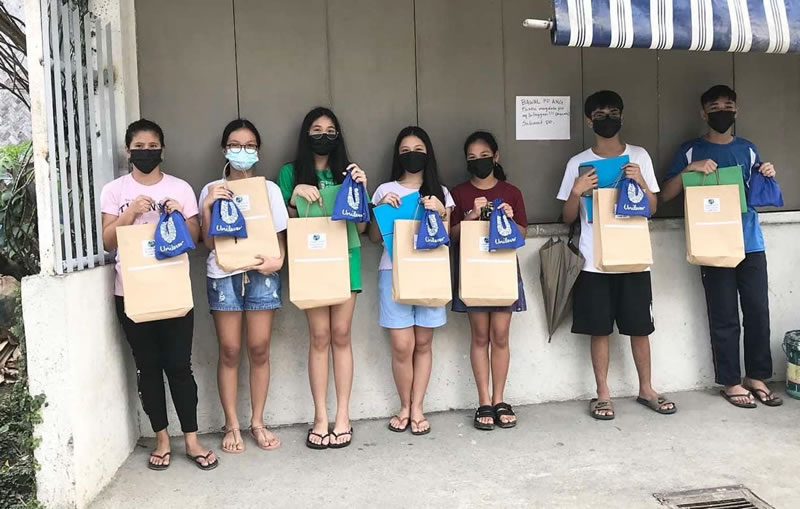
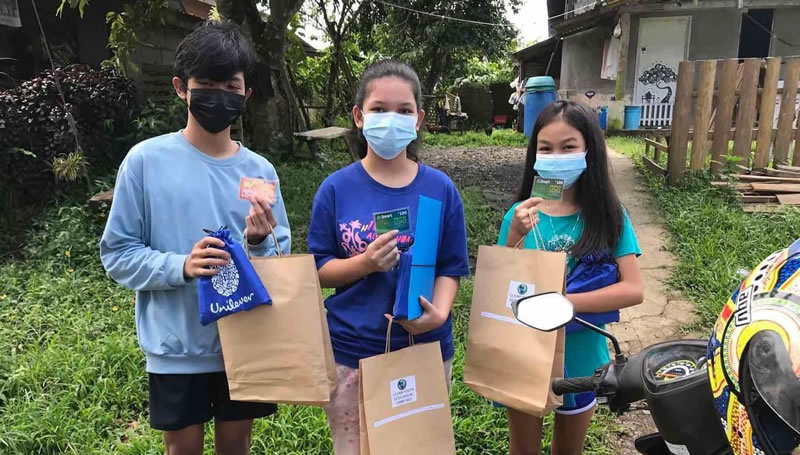
Closing Ceremony
Each school shared performances to showcase their talents while incorporating their learnings from the Eco-Camp. Additionally, the teachers and students also gave their feedback about the virtual Eco-Camp. The students emphasized that despite all the technical and logistical challenges, they were able to learn and enjoy the camp. They teachers were grateful of the practical skills they have gained in the Eco-Camp through the workshops and tools which were shared with them.
The eco-campers’ Action Plan was turned over to the Local Government and Department of Education representatives in a ceremonial manner. The certificates of participation were then awarded to all participants. The participating schools were each provided with copies of SCPW’s Manual for Conducting the Ecological Camp to facilitate replication of the activity.
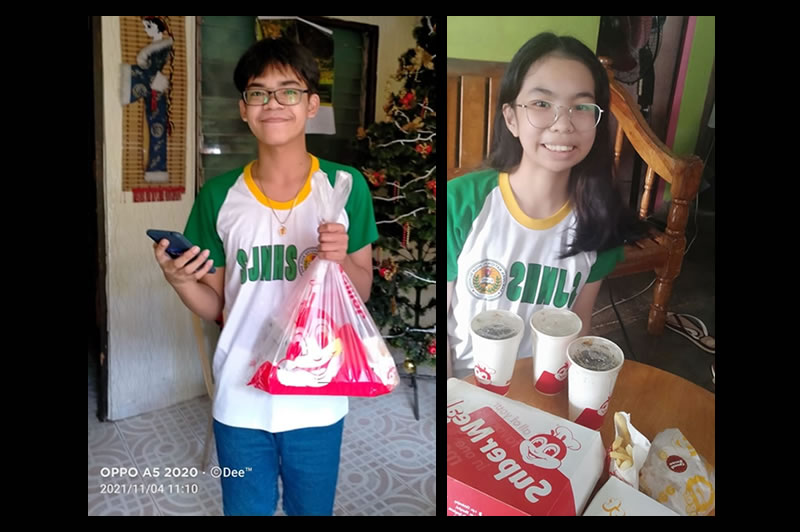
To close the event, Ms. Jasmine Cuizon, Public Relations Officer from the Public Information Unit of LLDA, and Ms. Amy Lecciones, Program Manager of CLEAR, gave their closing remarks. Ms. Cuizon expressed her gratitude to all the organizers and partners for their support and for making the CLEAR Youth Ecological Camp possible despite the pandemic. She challenged the participants to act and integrate into their lives the learning they had acquired in the Eco-Camp. Ms. Lecciones thanked everyone involved in the Eco-Camp and expressed her high hopes for the implementation of the action plan for Kalayaan, Laguna. She further encouraged the youth to be active in supporting the effort in wetland conservation particularly in Laguna de Bay and in Caliraya Lake.
CLEAR Partners

